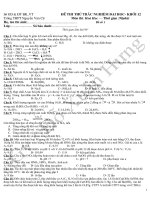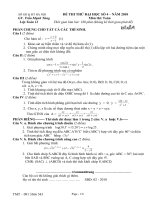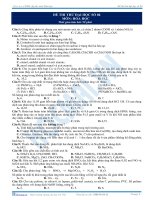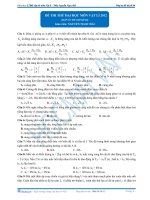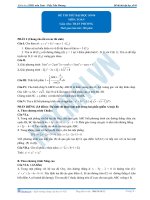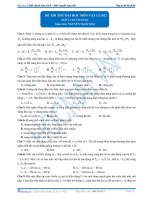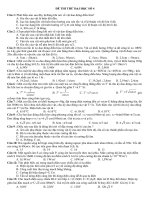ĐỀ THI THỬ ĐẠI HỌC – SỐ 4 ppsx
Bạn đang xem bản rút gọn của tài liệu. Xem và tải ngay bản đầy đủ của tài liệu tại đây (104.55 KB, 5 trang )
1. ĐỀ THI THỬ ĐẠI HỌC – SỐ 4
I. Chọn từ có trọng âm chính nhấn vào âm tiết có vị trí khác với các từ còn lại:
1) A. second B. many C. address D. parents
2) A. already B. property C. possession D. outnumber
3) A. occupation B. disappointment C. uncertainty D. unemployment
4) A. atmosphere B. dioxide C. disposal D. emission
5) A. poisonous B. volcanic C. unpleasant D. contaminate
II. Chọn từ thích hợp (ứng với A hoặc B, C, D) để hòan thành câu sau:
6) We have to pay attention ……… these difficult circumstances.
A. at B. on C. with D. to
7) Have they taken notice the “No smoking” sign?
A. at B. of C. on D. to
8) It’s hard to keep track ………… all one’s old school friends.
A. with B. to C. about D. of
9) Which would you , tea or coffee?
A. prefer B. preference C. preferential D. preferable
10) He is as as a post.
A. deafly B. deafness C. deafen D. deaf
11) I found the in a guidebook.
A. explain B. explanatory C. explainable D. explanation
12) Car ………… contains carbon monoxide which is invisible, but dangerous.
A rubbish B dust C garbage D exhaust
13) Too much exercise can be harmful but walking is good ……… you.
A to B at C with D for
14) Everyone in both cars ………… injured in the accident last night.
A was B is C are D were
15) There is a shortage of water because there has been very ……… rain recently.
A few B a few C little D a little
16) "Would you like some more biscuits?" -Yes, please, but only ………….
A few B a few C little D a little
17) Mr. and Mrs. Jones have been married for ten years. They have no children. They're a
………… couple.
A childlike B childless C childish D childhood
18) He opened the letter without to read the address on the envelope.
A bothered B bothering C bother D to bother
19) The city has been ……………. with toxic waste from local factories.
A polluted B pollution C polluting D polluter
20) What are the disadvantages of …………… in a big city?
A live B living C life D lively
21) There is a …………. to overcome problems.
A determine B determined C determination D determinate
22) Water vapour and carbon dioxide occur in the air ………….
A natural B naturally C nature D naturalize
23) English belongs ………… those who use it.
A to B from C with D on
24) Peter works for a company ………. makes bicycles.
A whose B whom C whose D which
25) After the war, thousands of people were reported to be ………
A homesick B homeless C home D. homely
III. Chọn nhóm từ hoặc mệnh đề (ứng với A hoặc B, C, D) để hoàn thành câu:
26) That’s the house …………………
A. that I used to stay.
B. which I used to stay.
C. where I used to stay.
D. I used to stay.
27) ………………………………. when I got there.
A. It was raining hard
B. It is raining hard
C. It rains hard
D. It rained hard
28) He said he would give me a ring as soon as ………………….
A. he will reach Paris.
B. he would reach Paris.
C. he reaches Paris.
D. he reached Paris.
29) He never goes home …………
A. before he finished his work.
B. before he has finished his work.
C. before he had finished his work.
D. before he will finish his work.
30) Is there any reason ……………….?
A. that you should have a holiday
B. which you should have a holiday
C. you should have a holiday
D. why you should have a holiday
IV. Xác định từ hoặc cụm từ có gạch dưới, cần phải sửa, để câu trở thành chính xác:
31) The floor i
A
s not enough
B
strong for u
C
s to dance o
D
n.
32) It is v
A
ery cold for u
B
s to
C
have breakfast i
D
n the garden.
33) It i
A
s difficult to get
B
used to e
C
at w
D
ith chopsticks.
34) By working day a
A
nd night, he succeeded
B
at fin
C
ishing the job on
D
time.
35) We sug
A
gested to
B
travel b
C
y train to see more o
D
f the country.
V. Chọn từ/ cụm từ thích hợp (ứng với A hoặc B, C, D) để điền vào chỗ trống trong đoạn
văn sau, từ Câu 36 đến Câu 45:
The tourist industry is considered to be (36) world's largest industry. Before 1950
about 1 million people (37) abroad each year (38) by the 1990s the figure had
(39) to over 400 million every year.
(40) large numbers of tourists, however, are beginning to cause problems. For
example, in the Alps the skiers are destroying the mountains (41) came to enjoy.
Even parts of Mount Everest in the Himalayas are reported to be covered (42) old
tins, tents and food that have been (43) away.
But at a time when we have greater freedom to travel (44) ever before, more and
more people are asking how they can enjoy their holiday (45) causing problems by
spoiling the countryside.
36) A the B a C one D that
37) A travelled B came C sailed D were
38) A as B because C but D when
39) A gone B flown C risen D raised
40) A Such B More C Few D So
41) A which B you C who D they
42) A for B on C with D below
43) A put B thrown C given D tidied
44) A than B when C then D while
45) A outside B instead C beside D without
VI. Đọc kỹ đoạn văn và trả lời các câu hỏi (bằng cách chọn phương án đúng, ứng với A
hoặc B,C,D) từ câu 46 đến câu 50)
Man discovered fire many thousands of years ago. The first time he saw fire was
probably when a tree was struck by lightning. He soon learned how to make fire for
himself, however. Man probably made his first fires by rubbing two sticks together.
Fire was very important to man. He needed fire to keep himself warm at night. He
used fire to cook his food. He used fire to frighten away enemies and wild animals. In
some parts of the world he used fire to signal messages. Red Indians, for example,
used fire to make signals. In some other countries people lit fires to warn their friends
of danger.
Fire was also used to give light. Before the invention of the oil lamp, man used
burning sticks as torches. And before man discovered gas and electricity, he hung
small fires in wire baskets from post to light the streets.
One man even used fire to tell the time. He invented a candle clock. He made a
candle that took exactly twelve hours to burn. Then he marked this candle in twelve
equal parts. He lit the candle and could tell the time by counting the number of parts
left of the burning candle. But the candle clock did not always work well. If there was
a wind blowing on the candle, the flame burned too quickly.
46) Man probably first made fire
A from a tree struck by lightning. B by rubbing two sticks together.
C from wire baskets hung on posts. D from a candle.
47) Man probably first used fire
A to tell the time. B to send signals.
C to light the streets. D to keep warm at night.
48) Why did Red Indians use fire?
A To make gas and electricity. B To burn down trees.
C To frighten away enemies. D To send messages.
49) The first street lights were
A large bonfires. B candles.
C burning trees. D small fires in hanging baskets.
50) What would happen to the clock if a wind blew on a candle clock?
The clock would
A tell the correct time. B be slow.
C be fast. D not tell the time.
________________________
